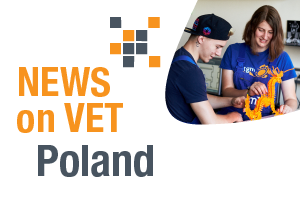The ‘Accessible school for all’ project aims to improve education quality by empowering teachers with skills to support diverse learners, including Ukrainian refugees.
The project seeks to change systematically the support model for learners at all levels of education, from preschool to vocational schools, ensuring that each specialist teacher takes responsibility for creating an inclusive school environment.
The project is being implemented by the Educational Research Institute (a national provider) with UNICEF and the Ministry of National Education, in collaboration with representatives from universities and NGOs. It runs from May 2023 to September 2025, with a budget of PLN 2 370 million in 2023 and PLN 7 million in 2024.
Accessibility in education means that every learner should have access to high-quality education resources, methods and activities that support their development. The ‘Accessible school for all’ project promotes change by increasing the accessibility of the learning environment for all learners. This accessibility is strengthened in cognitive aspects (educational materials scaled according to difficulty level), perceptual aspects (appropriately designed graphics, font size), linguistic aspects (simplified texts, accessible task instructions), and diagnostic aspects (facilitating the assessment of psychological and emotional functioning of children with disabilities or those not proficient in the Polish language, etc.). In practice, activities enhancing educational accessibility are conducted by specialist teachers, implementing selected interventions in school practice.
Aims, scope and target groups
Specialist teachers, such as pedagogues, psychologists, special educators, speech therapists, and educational therapists, will receive training to support diverse learners, including Ukrainian refugees. This training will improve the quality of education by equipping them with the skills necessary to provide tailored interventions that meet each learner’s individual needs. Interventions will benefit both learners and parents, resulting in an improved social environment and overall quality of education.
This support is especially important for the first-stage sectoral schools (providing VET programmes), as the number of students with disabilities in the first grade of these schools is higher than the total number of learners with disabilities in all other secondary schools across all grades. According to the recent PISA 2022 study, 15-year-old learners in first-stage sectoral schools had below level 2 skills in both reading and mathematics – the lowest performance among all students surveyed.
During the project implementation, support will reach approximately 30 000 learners, of which about 16% will be in the VET sector, involving around 11 200 teachers, 500 school administrators (20% from VET schools), and representatives from universities and NGOs. Any lessons learned will gradually be integrated in the education system for all learners.
Teacher training model
The project's specialist teachers become ‘Learning accessibility advisors’, thus expanding their specific area of specialisation. They are expected to create an inclusive environment by supporting other teachers and/or helping students with diverse needs directly.
Specialist teachers receive training in methodological strategies involving subject teachers and students. At the secondary school level, these strategies include developing the ability to see beyond one's own perspective of oneself and the world, simplifying texts during the education of students with diverse educational needs, using project-based learning methods to boost the self-efficacy of such students, and encouraging active participation in the process of education and self-development.
The educational institutions participating serve a diverse range of learners with unique educational needs and migration experiences. To address this diversity, a mental health and psychosocial support initiative has been designed, which includes free consultations with psychiatrists and psychotherapists for learners aged 18 years and older. Procedures have also been introduced in case of emotional crises in schools, such as suicide attempts, suicides committed, trauma (PTSD), and self-harm.
Developing a catalogue of best practices
The project aims to integrate evidence-based practices into the formal education system, improving accessibility and inclusiveness for all. Research activities include cataloguing effective practices in reducing educational problems and positively impacting learners, teachers, and the entire school community. Longitudinal quantitative studies with pretest and post-test designs and ethnographic research will allow for objective assessment of intervention strategies.
Read more
- Description of the project ‘Accessible school for all’ (PL)
- Project ‘Accessible school for all’ website (EN)
- Video promoting e-learning training in the ‘Accessible school for all’ project (sound PL only, auto-translation of subtitles)
- Video of the conference promoting the ‘Accessible school for all’ project (sound PL only, auto-translation of subtitles)
- ‘Accessible school for all’ – invitation to participate in the project (PL)
- Statistical data on school students in the school year 2022/2023 (accessed: 2.5.2024)
- Bulkowski, K., Dobosz-Leszczyńska, W., Kaźmierczak, J. (2023). Umiejętności polskich piętnastolatków. Najważniejsze wyniki badania PISA 2022 [Skills of Polish 15-year-olds. Key results of the PISA 2022 survey] (accessed: 15.3.2024)
| Please cite this news item as: ReferNet Poland; Cedefop (2024). Poland: skilling teachers to improve diverse learners' access to learning. National news on VET |
